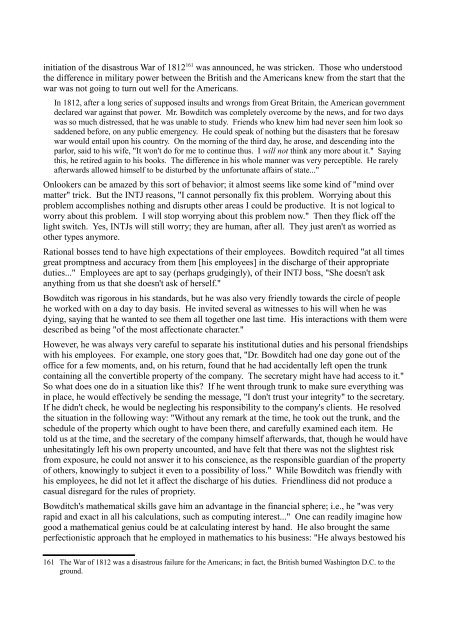You also want an ePaper? Increase the reach of your titles
YUMPU automatically turns print PDFs into web optimized ePapers that Google loves.
initiation of the disastrous War of 1812 161 was announced, he was stricken. Those who understood<br />
the difference in military power between the British and the Americans knew from the start that the<br />
war was not going to turn out well for the Americans.<br />
In 1812, after a long series of supposed insults and wrongs from Great Britain, the American government<br />
declared war against that power. Mr. Bowditch was completely overcome by the news, and for two days<br />
was so much distressed, that he was unable to study. Friends who knew him had never seen him look so<br />
saddened before, on any public emergency. He could speak of nothing but the disasters that he foresaw<br />
war would entail upon his country. On the morning of the third day, he arose, and descending into the<br />
parlor, said to his wife, "It won't do for me to continue thus. I will not think any more about it." Saying<br />
this, he retired again to his books. The difference in his whole manner was very perceptible. He rarely<br />
afterwards allowed himself to be disturbed by the unfortunate affairs of state..."<br />
Onlookers can be amazed by this sort of behavior; it almost seems like some kind of "mind over<br />
matter" trick. But the INTJ reasons, "I cannot personally fix this problem. Worrying about this<br />
problem accomplishes nothing and disrupts other areas I could be productive. It is not logical to<br />
worry about this problem. I will stop worrying about this problem now." Then they flick off the<br />
light switch. Yes, INTJs will still worry; they are human, after all. They just aren't as worried as<br />
other types anymore.<br />
Rational bosses tend to have high expectations of their employees. Bowditch required "at all times<br />
great promptness and accuracy from them [his employees] in the discharge of their appropriate<br />
duties..." Employees are apt to say (perhaps grudgingly), of their INTJ boss, "She doesn't ask<br />
anything from us that she doesn't ask of herself."<br />
Bowditch was rigorous in his standards, but he was also very friendly towards the circle of people<br />
he worked with on a day to day basis. He invited several as witnesses to his will when he was<br />
dying, saying that he wanted to see them all together one last time. His interactions with them were<br />
described as being "of the most affectionate character."<br />
However, he was always very careful to separate his institutional duties and his personal friendships<br />
with his employees. For example, one story goes that, "Dr. Bowditch had one day gone out of the<br />
office for a few moments, and, on his return, found that he had accidentally left open the trunk<br />
containing all the convertible property of the company. The secretary might have had access to it."<br />
So what does one do in a situation like this? If he went through trunk to make sure everything was<br />
in place, he would effectively be sending the message, "I don't trust your integrity" to the secretary.<br />
If he didn't check, he would be neglecting his responsibility to the company's clients. He resolved<br />
the situation in the following way: "Without any remark at the time, he took out the trunk, and the<br />
schedule of the property which ought to have been there, and carefully examined each item. He<br />
told us at the time, and the secretary of the company himself afterwards, that, though he would have<br />
unhesitatingly left his own property uncounted, and have felt that there was not the slightest risk<br />
from exposure, he could not answer it to his conscience, as the responsible guardian of the property<br />
of others, knowingly to subject it even to a possibility of loss." While Bowditch was friendly with<br />
his employees, he did not let it affect the discharge of his duties. Friendliness did not produce a<br />
casual disregard for the rules of propriety.<br />
Bowditch's mathematical skills gave him an advantage in the financial sphere; i.e., he "was very<br />
rapid and exact in all his calculations, such as computing interest..." One can readily imagine how<br />
good a mathematical genius could be at calculating interest by hand. He also brought the same<br />
perfectionistic approach that he employed in mathematics to his business: "He always bestowed his<br />
161 The War of 1812 was a disastrous failure for the Americans; in fact, the British burned Washington D.C. to the<br />
ground.




